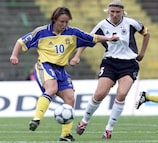1989: Doris Fitschen
Sunday, July 2, 1989
Article summary
Doris Fitschen was the outstanding captain of the side that first took Germany to the forefront of the European game and speaks to UEFA.com about their pivotal 1989 championship win
Article top media content

Article body
As the outstanding captain of the side that first took Germany to the forefront of the European game, Doris Fitschen is seen by many as the Franz Beckenbauer of 'Frauenfussball'.
Blazing the trail, the technically-gifted sweeper inspired her country to their first European triumph in 1989 and then three more before earning a bronze medal at the 2000 Olympic Games. Perhaps even more significantly, Fitschen became the first true icon of women's football in Germany, helping her side win the kind of recognition previously the sole preserve of the men. "I had a great career, with the chance of being part of the sport's development from its early stages to the first successes," she told UEFA.com. "Having promoted women's football in Germany is a nice personal achievement. Nobody can ever take that away from me."
Like so many of her peers, the fierce competitor with distinctive blonde locks had to learn the ropes competing with boys in her home town, Zeven. But by the time injury forced her to retire in 2001, Fitschen had travelled a great distance – from her own first touches of the ball in the small fishing outpost to the birth of the professional game in the United States. "The chance to play professional football in the United States was awesome," she explains. "All of a sudden I was earning money through football and didn't have to do anything else except go to practice and play in front of 8,000 to 10,000 people every week. I was used to crowds of 500 back home!"
It was not only in her homeland that she broke new ground. As captain of the Philadelphia Charge, she scored the first-ever goal in WUSA history, a historic moment she tries to downplay with typical modesty: "I'll always remember that goal, mostly for how I scored it. It was one of my worst penalties ever, but sometimes you need a bit of luck." Luck alone, however, cannot account for the three German league titles, three German Cups and one Super Cup Fitschen picked up before crossing the Atlantic. Nor was there anything in the least bit fortuitous about her record 144 international caps, or the UEFA award she received for her contribution to the sport.
She continues to serve the game to this day, having switched to a role in marketing for the German Football Association, which totally altered her perspective, and she is also now team manager to the national women's squad. "When I was a player, I travelled to an international match, performed for 90 minutes and went straight back home again," she said. "I never thought about what it took to organise everything. It really is hard work to get all the fans into a stadium and to get everything ready for things like broadcasting." The 2011 FIFA Women's World Cup was awarded to Germany, a celebration of a sport and a team given a huge boost by the feats of Fitschen and Co two decades earlier.















